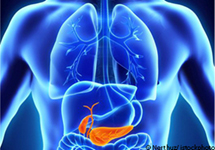Gallstones: when the gall bladder strikes

If the gall bladder is greatly enlarged, an acute gall bladder infection may be present.
What gallstones have to do with this, and how to treat the disease, is explained by the surgeon Professor Dr. Jens Höppner.
The task of the gall bladder is to store bile from the liver and supply it to the duodenum for digestion. When a gallstone blocks the cystic duct - the exit from the gall bladder - then bile and bacteria accumulate. An inflammation develops and the gall bladder often enlarges and becomes swollen. "This inflammation causes pain in the upper right abdomen. At the same time the gall bladder is fighting the wedged stone. The patient then feels cramps in the abdomen as the gall bladder contracts," says Professor Dr. Jens Höppner, Managing Senior Physician in the Department of General and Visceral Surgery at the Medical Center - University of Freiburg. Many patients develop a fever as a result of the inflammation. If the gallstone slides out of the gall bladder into the common gall duct, it can also cause jaundice. Nausea and vomiting are other signs of an acute gall bladder infection.
To determine whether the gall bladder is enlarged or inflamed, the surgeon examines it using an ultrasound device. If the gall bladder is very inflamed, it must be removed. This is either done in an open operation under general anesthesia via an abdominal wall incision, or else using the keyhole technique. The latter is employed most frequently at the Medical Center - University of Freiburg. "In four small steps, a camera and the working instrument are introduced into the abdominal cavity. This avoids a large abdominal incision," says Professor Höppner. The operation takes about one to two hours. In Germany, 176,000 operations of this type are carried out every year.
For patients, life without a gall bladder usually presents no problems. The bile flows directly from the liver into the duodenum. Digestion thus continues to function normally, and no special diet has to be followed.
Back